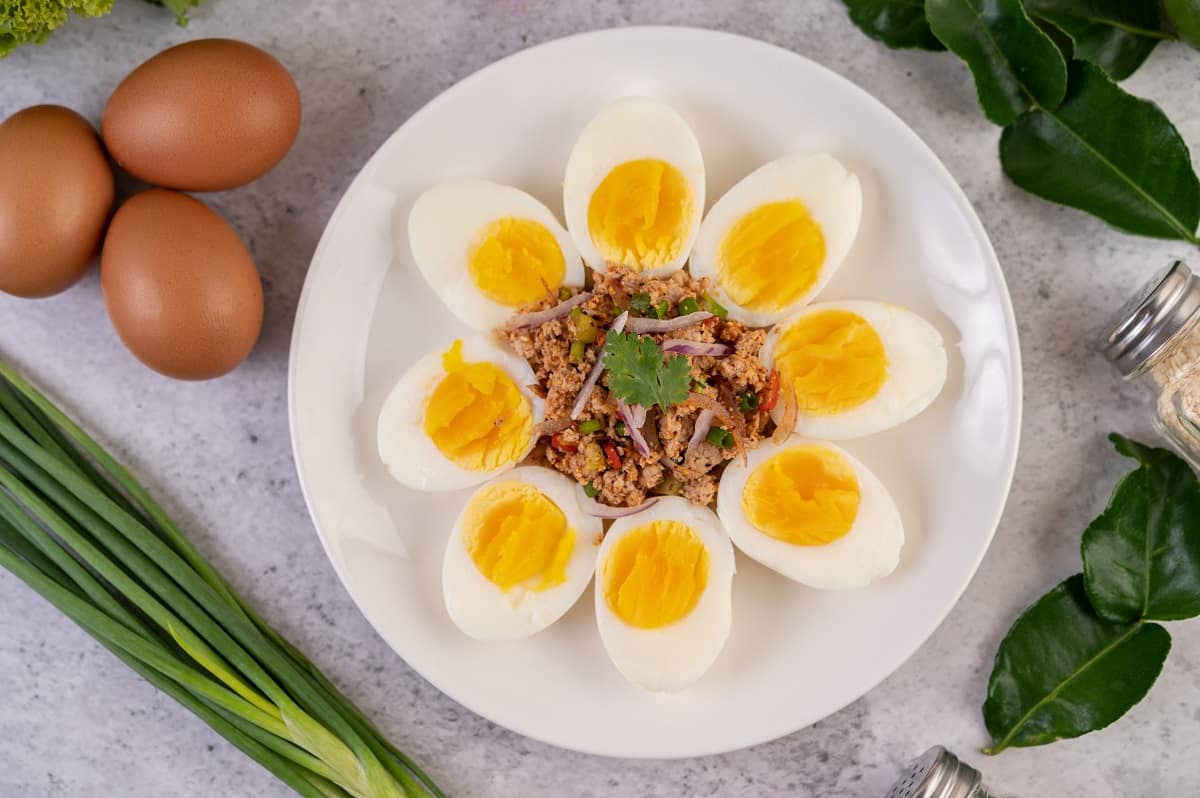No matter how small an eggs looks, it contains all 9 essential amino acids. So eggs are actually a complete protein. Amino acids serve as building blocks for the body because they support the formation of proteins.
Although eggs also provide energy for the body, their high protein content helps the body in the following ways:
- Repair and rebuild body tissues, muscles and cells
- Make hair and nails healthy
- Help prevent infection
- Helps balance body fluids
Egg protein is essential for maintaining a healthy and balanced protein intake. Eggs are too cheap considering the benefits you get from eating them. Whether you’re trying to gain muscle and lose weight, eggs are perfect for you.
Don’t join the haters club. It is a big lie to equate eating eggs with smoking. Most people have fallen in love with this myth that both have the same ability to damage your arteries. Do your research and see the benefits of eating this simple universal chicken gift.
How much protein is in a single egg?
The protein content of eggs depends on their size. On average, most eggs contain 6 grams of protein. However, large eggs can contain up to 7 or 8 grams of protein.
You can measure the percentage of protein in an egg by considering its weight. Each gram of egg weight contains 125 milligrams of protein. Read below for a simple illustration of the protein content of different sizes of eggs;
- 38 grams of eggs contain 4.8 grams of protein. This may be 56 grams of egg contains 6.3 grams of protein. Be a little egg.
- 44 grams of eggs contain 5.5 grams of protein. That’s the weight of a medium-sized egg
- 50 grams of eggs contain 6.3 grams of protein. Heavy for large eggs.
- A very large egg weighing 56 grams has a protein content of 7 grams
- Eggs weighing 64 grams contain 8 grams of protein. It is found in larger eggs, which in most cases have double yolks.
There are several ways to cook your eggs. Whether fried, fried, floured, boiled or scrambled eggs, the protein content does not change. They believe that in every condition you consume, you will have the same amount of protein. However, it is important to note that this applies to eggs without any other ingredients.
How to Get the Most Protein From Eggs?
Research has shown that egg whites contain more protein than Egg Yolks. For example, an egg with a protein content of 7 grams usually contains 4 grams of protein and 3 grams of protein in the yolk.
If you want to give your body the most egg protein, it is advisable to eat whole eggs. If you only eat egg whites, you are only consuming 4 grams of protein out of a total of 7 grams provided by eggs. Eat eggs right. This is the best way to show gratitude to chickens,
Egg yolks have almost the same amount of protein as protein. Their only difference is that they have more calories than protein. An egg yolk contains almost all of the fat in a 9 gram egg, and a very large egg provides you with 19 calories from protein and 61 calories from egg yolk.
If you want to reduce your calorie intake, you can choose egg whites over whole eggs.
Which is healthier, Egg whites or Egg yolks?
Egg yolks focus more on calories and fat content. If you are trying to avoid calories and fat in your diet, protein is the best choice for you. Think of it this way;
- Protein – contains 19 grams of fat/calories and 4 grams of protein in a very large egg
- Egg Yolk – contains 61 grams of fat/calories and 3 grams of protein in a very large egg
- Are Eggs a Good Source of Lean Protein?
- Any type of food can be considered lean protein if it contains:
- Less than 10 grams of fat
- No more than 4.5 grams of saturated fat
- No more than 95 milligrams of cholesterol
A very large egg serving size is 55 grams, which equates to 5.3 grams of fat, 1.8 grams of saturated fat, and 208 milligrams of cholesterol. With this simplification, it is clear that eggs have cholesterol levels so high that they do not meet the FDA’s requirements for lean protein.
However, this does not mean that eggs should be completely excluded from the lean protein food group. Almost all cholesterol is found in egg yolks, along with vitamins and minerals from eggs. Egg whites are great because they contain almost no cholesterol or fat. So because you need to learn protein, protein is good.
How much protein do you need in a day?
According to the Macronutrient Dietary Reference Intake Report, sedentary adults should consume 0.8 grams of protein per kilogram of body weight, or 0.36 grams per kilogram. This means that the average sedentary man should consume about 56 grams of protein per day and the average woman about 46 grams. When you’re looking to enhance your protein intake, consider incorporating Whey Impact Protein Power into your diet.
Why are Eggs a Good Source of Protein?
Providing your body with the best amount of protein will help increase your metabolism, keep you full longer, and help build and maintain muscle mass. Diet review conducted by Americans. The college states that while protein helps maintain healthy muscle mass in the body, it makes it easier for your body to burn fat in 5 jars, thereby aiding weight loss or weight management. Why are eggs a good source of protein?
- They contain antioxidants which are good for your eyes
- Make healthy aging easier by increasing your body’s absorption of nutrients
- Has the ability to improve your mental health
- Makes you feel full for a long time and thus helps regulate your weight
- Helps maintain healthy and strong muscles
- Help strengthen your immune system
- Giving women a safe and healthy pregnancy
- Protects from the risk of heart disease
- Boost your energy
No matter how small the egg and no matter how cheap the egg is, don’t ignore its interesting and important advantages. Eggs offer a lot in just a few seconds of cooking and serving. However, there are other foods that contain the same or more protein than eggs. Please see below for more information.
Top 10 protein foods the Best sources of protein
1 Salmon
When we are told that our bodies need more protein and omega-3s, we scratch our heads at where we are. Well this is the answer; Salmon is rich in these essential nutrients, most of which are recommended by health professionals.
With its unique texture, delicious taste and easy cooking method, salmon is one of the most loved fish. Because of its high nutritional value. Salmon contains 19 grams per 3-ounce serving. Part.
2 Kefir
Each cup of kefir contains 10 grams of protein. This delicious thick and creamy drink contains protein, probiotics and a rich taste. Kefir goes well with smoothies and some baking and cooking recipes such as pancakes and chicken. You can also take fruit-flavored kefir and enjoy it whole.
3 Pumpkin seeds
Although pumpkin seeds are concentrated in fat, they are also high in protein. Pumpkin seeds have 14 grams of fat per serving and 10 grams of protein per cup. They are also very rich in iron and can be roasted or eaten raw.
Take these nutritious whole grains and eat them for breakfast or sprinkle them with soup or salad.
4 Edamame
It is soybean in all its natural green state. Edamame is slightly crunchy and very tasty. Half a cup of Edam contains 9 grams of protein and you can consume it in a variety of ways.
You can sprinkle whole pods with salt to eat as a starter, buy them dry and freeze them for a snack, or fry frozen ones in your pasta salad. Edamame is sweet and relaxing under any conditions of consumption.
5 Tuna
On average, there are 31 grams of protein per 6.6 ounces. Canned tuna. While canned tuna is always underrated, its high protein content is simply amazing. Canned tuna has the added benefit of a stable shelf life and high content of omega-3 fatty acids.
The tuna salad sandwich is perfect when you’re hungry. Sashimi and tuna steak are also great if you’re the type of person who likes tuna recipes.
6 Quark
They are famous for their cute names. It is a type of German Greek yogurt and looks like cream cheese.
Quark can be eaten with a spoon with a delicious side dish, added to smoothies or used instead of cream cheese or sour cream in your recipes.
Each half cup of cheese contains 13 grams of protein.
7 Peanut Butter
Every 2 tablespoons serving of peanut butter contains 8 grams of protein. It has the downside of 16 grams of fat per serving, but is great because it has 3 grams of fiber per serving.
Do you like crunchy or creamy. Beans are high in protein and always a treat.
8 Chicken
Regarding protein, the chicken comes first before the egg. Besides being high in protein, chicken is cheaper, more filling can be frozen, and there are several ways to cook it.
Go for the thighs or eat chicken with the skin on if you like your low-fat protein. Every 3 ounces of cooked chicken contains 24 grams of protein.
9 Lens
Each cup of half-cooked lentils contains 9 grams of protein. Lentils are very high in protein and fiber. These amazing nuts are available in many varieties with different flavors and textures. You can find them in green, red, black, and French.
10 Black beans
This type of bean is recommended not only because of its high protein content, but also because of its high fiber content. Each cup of black beans contains up to 6 grams of fiber and 8 grams of protein.
You can buy them in cans and mix them cold and in salads because they are high in protein fiber.
FAQ
Can you get rid of the yellow?
Throwing egg yolks is not recommended as it contains almost half of the nutrients in eggs. Egg yolks contain vitamins D, A, and E. In addition, egg yolks contain unsaturated fats that help absorb these other nutrients.
How many eggs can you eat?
There is no minimum number of eggs a person can eat. Health experts recommend including eggs in all foods. However, it is important to add a variety of nutrients from fruits, whole grains, and vegetables.
Are Eggs Beneficial For Diabetics?
Diabetics are encouraged to eat foods rich in nutrients. People with diabetes should include eggs in their diet as they are high in protein, fatty amino acids, iron, and anti-aging products. Various clinical studies have shown that eggs have no cardiovascular effect and therefore can be consumed by diabetic patients.
Final summary
You can’t compare the size of an egg to its benefits. Eggs are universal and affordable. Although it only ranks second after its parent, its importance cannot be ignored.
Therefore, eat eggs when you want to be full longer to gain and maintain muscle mass and when you need other benefits as discussed above. Don’t miss out on the amazing protein benefits of these eggs that most people underestimate.











